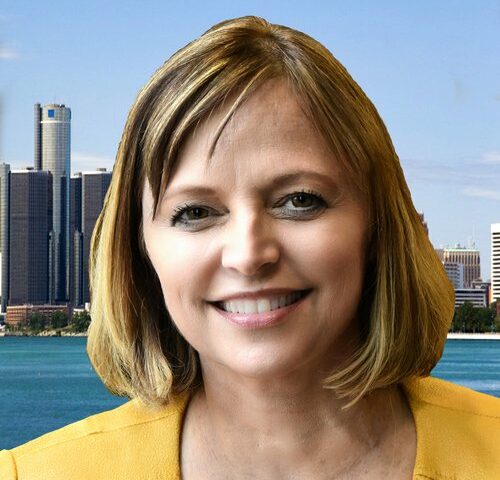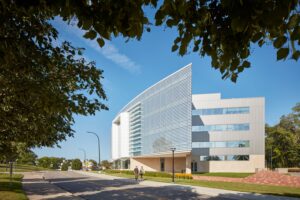
- Kim Kisner
- Community
- 07/27/2022
Connie Lilley, is the Executive Director of One of 24 2030 Districts Across North America

SBN Detroit interviews the executive director of the Detroit 2030 District, Connie Lilley. Connie has been working within the commercial built environment for over 25 years, with the last 16 years focusing on energy efficiency and sustainability. She has served on many industry trade groups, including past vice chair for the U.S. Green Building Council, Detroit Regional Chapter, where she implemented the popular My Green School Art Contest that runs annually throughout Michigan. Connie has received two awards from the National Women in Construction Detroit Chapter for being a green/sustainable leader. She has also volunteered for BOMA, IFMA, and the City of Detroit Green Task Force.
Connie is a LEED AP, O & M (accredited professional, operations and maintenance) and has an MBA focusing on corporate sustainability.
Q: Please tell me about Detroit 2030 District and your role.
A: I am the executive director of the Detroit 2030 District, which is a nonprofit working with building owners and managers to help them reduce energy and water consumption and transportation emissions to and from their buildings. The movement promotes a carbon-free future, high-performance buildings, economic development, and environmental justice.
The District is one of twenty-four 2030 Districts across North America, with three in Michigan – Grand Rapids, Detroit, and Ann Arbor. The Detroit 2030 District Is the fourth-largest District in the network, with over 51 million square feet committed. The District has 40 local nonprofit partners and 42 local businesses that support the program. The Detroit District was launched in 2017 with the support of the Michigan Department, of Environment, Great Lakes, and Energy.
Q: Please elaborate on the work you are currently doing.
A: We offer our building members resources and a robust calendar of educational opportunities to learn how to reduce energy and water consumption, transportation emissions, and operating expenses. We have three best practice groups, including houses of worship, venues, and museums, and multifamily. We assist our members in many ways, including helping them start an Energy Star Portfolio Manager Account to measure and track energy and water consumption and work towards reducing them. We also run many pilots on new technologies at member buildings, allowing our members to see if the technology is suitable for their buildings. We run webinars on relevant topics, including funding mechanisms, grant opportunities, renewables, green infrastructure, solar, etc.
Q: You were instrumental in bringing a District to Detroit in 2017. What prompted this and what was the process of bringing this to Detroit?
A: My industry colleague, Peggy Matta, and I talked for many years about the benefits of this type of program. We knew that Detroit had many aging buildings that would need renovation in the coming years. If Detroit were to make a comeback, healthy buildings and communities would be significant to the process and help to spur economic development.
We both know it is best to consider energy efficiencies and other high-performance building techniques before a building is built or renovated. We felt we would be more successful in helping to rebuild Detroit if we educated many building owners at a time instead of one at a time.
We had heard of the 2030 District Network and how it works. We thought it would be great to bring a District to Detroit.
After working for several years with many volunteers and an exploratory committee, we became an Emerging 2030 District. After a lot of groundwork, and collaboration with municipalities, businesses, and nonprofits, our movement began to grow and finally became a full District in 2017. Peggy became the founder and Chair of the organization and is still very involved.
Q: Are you pleased with the progress and impact you’ve been able to make?
A: While there have been many ups and downs, including the pandemic, flooding, stormwater issues, and the political environment, we have made it through.
Never in my wildest dreams did I think we would have 51 million square feet signed into our program. When we were first touting the benefits of reducing carbon emissions from the built environment, the conversation about the impact of climate change on the built environment was challenging. Many people didn’t understand the economic and health benefits of reducing a building’s carbon footprint.
Since our inception, we have helped hundreds of building owners and facility managers understand how to measure, track and work to reduce energy and water consumption. Many building owners don’t have an energy manager or a sustainability professional who understands how to combat issues with climate challenges.
We have implemented several successful programs, including a Museum Best Practice Group, which has gone national across all 2030 Districts. Our unique House of Worship Best Practices Group includes over 20 local congregations. This program partners with 15 different local businesses and the EPA for Congregations and has crafted a collaboration opportunity for all denominations.
One of the District’s strengths is bringing together groups of people from different entities and organizations to collaborate on strategies. Our program provides various events and workshops that bring people together that may not have had the opportunity to meet before. Facility managers across the city can now collaborate and work together instead of in a silo. Sharing best practices reduces the time and effort a building owner/manager must put into understanding climate challenges and overcoming them.
We launched the Detroit Energy Challenge along with the City of Detroit and the Michigan Battle of the Buildings. Our first awards breakfast took place this June. We will also be adding awards in the future for internal water consumption reduction. This competition is an excellent opportunity for us to recognize facility managers who have done a fantastic job reducing energy consumption and carbon footprint
Our organization also supports a future benchmarking ordinance for the City of Detroit. We are hopeful to see this pass soon as it will allow building owners to benchmark their buildings.
We have made great strides and relationships with the local utilities, including DTE and Detroit thermal. We work to understand their goals and missions to reduce carbon emissions, and in return, they work with us to create programs to help our members.
We do a lot of work in gathering building data. We have created energy baselines for buildings in Detroit and are currently working on a transportation baseline. We collect energy and water data from our members (anonymously)and will aggregate the data and report on our district reductions in the future.
We have assisted the city of Detroit by helping them to benchmark their buildings.
Q: You also created the Detroit 2030 District Advisory Council. Tell me about that, please
A: As of April 2021, we became a 501c3. Our board of directors is 17 individuals with a shared vision, including building owners and managers, industry professionals, utilities, education, nonprofits, businesses, and more.
Q: From your perspective – what is the role of businesses in Detroit in terms of sustainability overall for the city?
A: Our program is focused on helping facility managers, But many of our building owners and managers have a business or tenants in their building. Therefore, you can see how our program overflows to helping businesses and tenants.
All businesses should focus on the Triple-Bottom-Line: which considers all people, the planet, and the business profit. Business owners should work to reduce any unnecessary waste from all facets of their business.
Sustainability is a lifelong challenge for all firms, businesses, and even us as individuals. We all face the same challenges in reducing our footprint, even in our personal lives. We will always need to learn how to do things better on our walk to sustainability. There will be no end to the need for education to reduce one’s carbon footprint.
If a business is not focusing on sustainability and ways to reduce its carbon emissions, it will fall behind the competition. Consumers are getting savvier and more demanding and looking for ways to reduce their carbon footprint. They want to work for and buy from companies that show that they are paying attention to climate issues. Tenants are looking to work and live in green and healthy buildings.
Q: What are the most impactful things a business can do to really make a difference?
A: Create a sustainability plan and energy management plan. Take the time to understand environmental justice issues in your community and work to combat them. Offer employees and tenants the opportunity to get involved.
Many employees are looking for ways to get involved with sustainability. Create a green team at your business, organization, or building. Understand your business’s strengths and weaknesses concerning the triple bottom line. Understand your challenges and create opportunities with your staff and local businesses to work together to overcome the obstacles to reduce your business’ carbon footprint.
Q: What do you see as the biggest challenges for facility managers and owners that you work with when it comes to sustainability?
A: Time is always a challenge.
It is difficult to find time to put towards understanding climate issues and working to combat them. Many facility managers have worked at their building for years and have not faced climate issues in the past. Sorting through the massive amount of information out there can be very time-consuming and confusing. We offer our members resources and assistance on all sorts of initiatives, saving them time and money.
Funding is another problem. Finding the capital for energy upgrades is an issue for many building owners and managers. We strive to help our members find better ways to fund upgrades and offer grant opportunities when available.
Q: Can you name a few building owners and managers that are doing it well?
A: The Detroit Energy Challenge winners are examples of some of our members’ great work. 2021 winners include Shelborne Development, Fifth Third Bank, Bedrock, Huntington Place, and Comerica Bank.
Kim Kisner
- All
- Business
- Community
- Education
- Events

The Chip Bag Project, based in Detroit, is a sustainability initiative that upcycles hard-to-recycle snack packaging — particularly chip bags — into insulated sleeping bags for individuals experiencing homelessness. Founded by Eradajere Oleita, the project addresses both environmental waste and housing insecurity by transforming materials like Mylar into practical, thermally efficient solutions. In June, Oleita was among Trelllis’s 30 Under 30, its annual recognition of the brightest young...

PowerPanel, headquartered in Oxford, focuses on sustainable energy technology with a particular emphasis on hot water systems and thermal energy capture. The company designs and manufactures modular solar hybrid systems that integrate both photovoltaic and thermal components into a single unit. Its goal is to offer energy solutions that are more efficient, durable, and economically viable for a range of commercial and industrial applications. SBN Detroit interviewed Garth...

The Detroit VA Healthcare System is implementing a systemwide sustainability strategy through its Green Environmental Management System (GEMS), designed to reduce waste, lower energy consumption, and improve operational efficiency. The program recently earned Practice Greenhealth’s “Top 25 Environmental Excellence Award.” Through coordinated efforts across departments and a commitment to innovation—particularly in high-resource areas like dialysis—the Detroit VA works to demonstrate how environmental stewardship and clinical care can go...







